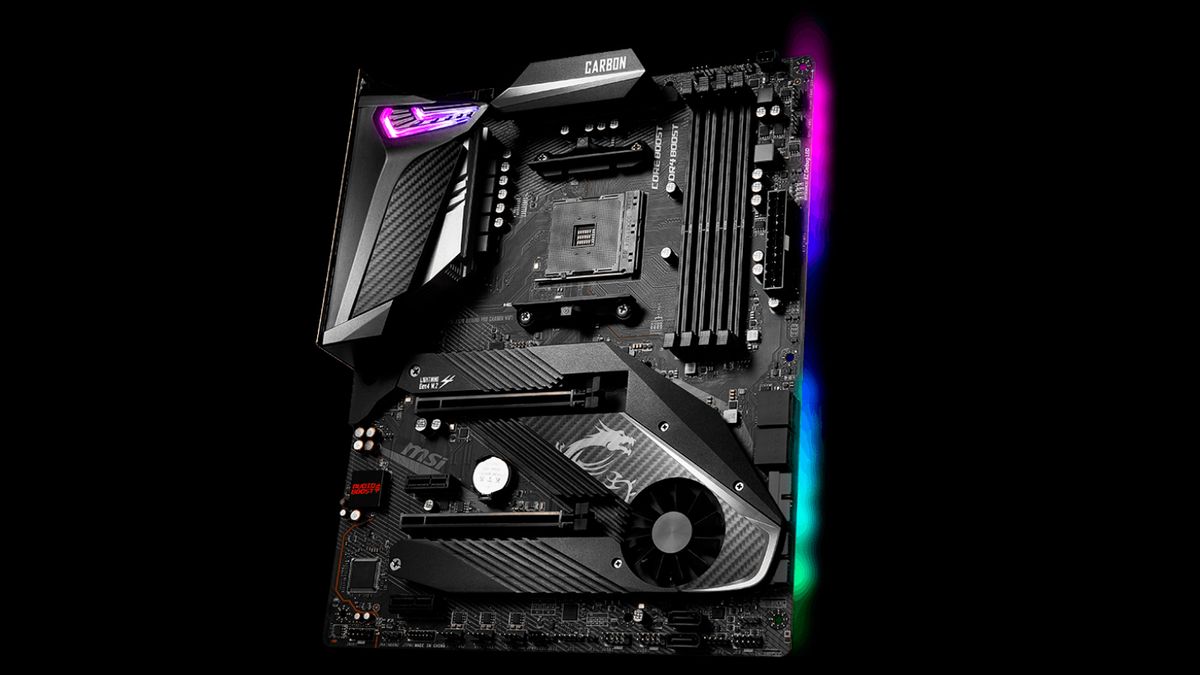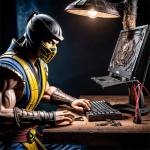my friends computer, on an msi x470 gaming plus pro, stopped working. im trying to take the first step towards fixing it by booting from USB. booting from a windows USB will give me a waiting screen forever. booting from an Ubuntu USB will give me the errors attached with a screenshot. all USB ports have been tried. all boot orders have been tried. the bios knows the name of the drive in the m2 slot and how big it is. the bios says it was able to do a format of the drive with safe delete. i have spent a long time looking for features like secure boot, and have disabled all i can find. i have flashed the bios, and reset the settings many times
You are using an out of date browser. It may not display this or other websites correctly.
You should upgrade or use an alternative browser.
You should upgrade or use an alternative browser.
msi x470 gaming plus pro wont boot from usb
- Thread starter chopficaro
- Start date
More options
Who Replied?Read error so have you tried a different USB drive?
Disconnect everything but mouse/keyboard and graphics before booting, i think this is an error in device detection so that it just refuses to boot.
Bluetooth, joysticks and such might be it.
Edit: A second trick if that does not work - Power down - Disconnect everything, including power - Press the power button about 40 times, wait a minute - connect the necessary stuff and try to boot.
Then connect one and one between rebooting.
Bluetooth, joysticks and such might be it.
Edit: A second trick if that does not work - Power down - Disconnect everything, including power - Press the power button about 40 times, wait a minute - connect the necessary stuff and try to boot.
Then connect one and one between rebooting.
WHAT?!?!? IS THIS PC REPAIR OR MORTAL KOMBAT???Disconnect everything but mouse/keyboard and graphics before booting, i think this is an error in device detection so that it just refuses to boot.
Bluetooth, joysticks and such might be it.
Edit: A second trick if that does not work - Power down - Disconnect everything, including power - Press the power button about 40 times, wait a minute - connect the necessary stuff and try to boot.
Then connect one and one between rebooting.
UPDATE: thank you i disconnected more stuff and tried what you said. i am able to run off of the ubuntu usb, but i cant install it. before doing either, i get that aa error. the aa error shows up differently and many times and just briefly before running, but still cant install
I think your drive might be a problem, but this is more of a Linux question, but i think it means the filesystem is corrupt, and i am not the one to ask for Linux support really as i am a newbie myself.
- Reboot and intercept the GRUB boot menu.
- Press the e key to edit the boot options.
- Find the line beginning with "linux" and add fsck.mode=force to the end of the line.
- Press F10 to continue booting
- Watch fsck run for all disks.
i dont know how to do that. but i did however, after many attempts, finally find secure boot under windows configuration in the boot menu. it was enabled, however, disabling it doesnt change anything. there are a lot of options in secure boot
From what i can gather, the drive is corrupted after install. It could be cables, or the disk itself, or maybe even a bad USB image from the USB disk, but again, i am a newbie to Linux.
Reformat everything if possible using repair CD's you can download and burn online, and make a new image on a perhaps different USB-disk to see if it helps, but my bet is that the disk itself is worn and needs replacement.
But try this:
Reformat everything if possible using repair CD's you can download and burn online, and make a new image on a perhaps different USB-disk to see if it helps, but my bet is that the disk itself is worn and needs replacement.
But try this:
good tips, i tried a new cable, multiple ways of formatting the drive and multiple drives. one thing i haven't tried is disconnecting the m2 card. but idk if that would do anything and im tired and i think im just gonna bring it to the computer shop tomorrow. thanks for helping, i feel like we narrowed it down quite a bit
grstanford
Ars Praefectus
Does the machine have a TPM enabled in it? Sounds like the drive was encrypted by the TPM and the system has lost/forgotten the key, hence the read errors.
The motherboard is an AMD x470 and those could be affected by an AGESA bug relating to TMP 2.0 Usually presents as stuttering in gaming.

 www.tomshardware.com
www.tomshardware.com
The motherboard is an AMD x470 and those could be affected by an AGESA bug relating to TMP 2.0 Usually presents as stuttering in gaming.

AMD's Bugfix for Ryzen Stuttering Now Widely Available
Spoiler alert, almost all AM4 motherboards already have the microcode update
What do you mean "disconnecting the m2 card"? How would you install the OS if you remove the drive? What kind of drive or drives are you working with?one thing i haven't tried is disconnecting the m2 card.
It unlikely to be anything related to the fTPM. The TPM can't just encrypt a drive by itself, or cause read errors but still allow you to format the drive. Secure Boot should be irrelevant because the Ubuntu install drive is compatible with Secure Boot. If it wasn't, it wouldn't even begin to boot to Linux and give you the errors.
You say you tried multiple drives, do you mean USB drives or SSDs? The "safe delete" or Secure Erase option in the BIOS doesn't do anything except clear the self-encryption data (which makes all the actual data on the drive unreadable and unrecoverable). It does not do any kind of formatting or testing to ensure the rest of the drive is good (that's why it takes only seconds). This sounds like there is a problem with the SSD which is bad enough that it even causes problems booting from USB, likely when it's trying to enumerate disks.
Formatting and other scans of an SSD are not super reliable ways of knowing whether it's good or not because of the way they work fundamentally. You say you tried multiple ways of formatting it but if you had so many problems even booting to a USB installer I don't know how many ways you could have tried, and the first thing any installer does to the drive is going to be to try formatting it which seems to be when the failure happens.
A replacement SSD to test with would be like $20 for a cheap model, just to see what happens, but you may as well just buy a model that would be what your friend needs, and if that doesn't fix the issue then return it. You're going to spend a lot of money taking it to a repair shop otherwise, and they're just going to sell you a drive that they've marked up in price by 50% or more. I'd give 90% odds that it just needs a replacement SSD, assuming it's an M.2 drive.
yes ive tried lots of different types of usb sticks and ssds and hard disks. im just taking this one to the boys at showtime computers today, thanks guys
what a f*** p** of s* i must have spent 20 hours on and its probably a bios option i cant find. the motherboard and the drives all work
If you think it is that, then do a factory reset/optimal settings reset on the BIOS options and then a basic setup to see if that helps. Another option is to remove all RAM but the 'first' stick and try again. Then swap that stick with a different one, and/or swap the RAM to a different slot and try again. RAM issues will often show as a drive read/write error during drive access causing a crash.
i did flash the bios, i did not test the ram, maybe i should have. but i think it might be the missing keys thing that grstan ford was talking about.If you think it is that, then do a factory reset/optimal settings reset on the BIOS options and then a basic setup to see if that helps. Another option is to remove all RAM but the 'first' stick and try again. Then swap that stick with a different one, and/or swap the RAM to a different slot and try again. RAM issues will often show as a drive read/write error during drive access causing a crash.
anyways, the computer is at my friends shop, and we will all find out the true answer soon. sorry for accidentally posting a naked picture of myself earlier, i didn't realize the black screen was reflecting me!Does the machine have a TPM enabled in it? Sounds like the drive was encrypted by the TPM and the system has lost/forgotten the key, hence the read errors.
The motherboard is an AMD x470 and those could be affected by an AGESA bug relating to TMP 2.0 Usually presents as stuttering in gaming.

AMD's Bugfix for Ryzen Stuttering Now Widely Available
Spoiler alert, almost all AM4 motherboards already have the microcode updatewww.tomshardware.com
It's not. The TPM would not allow you to even read or attempt to write to the drive if it was somehow encrypted, the OS would report an error that shows it's encrypted, and if you've swapped drives then the new drive is not encrypted in any way at all, and these errors are not what you'd see if there were an encryption issue. This is a hardware fault, and if you've replaced all those parts, and if testing the memory one by one doesn't isolate it, then there's a fault with the mainboard or CPU (the first M.2 slot is linked directly to the CPU by PCIe and the second is connected to the chipset). Did you try it with the SSD installed in both the first and second M.2 slots?but i think it might be the missing keys thing that grstan ford was talking about.



